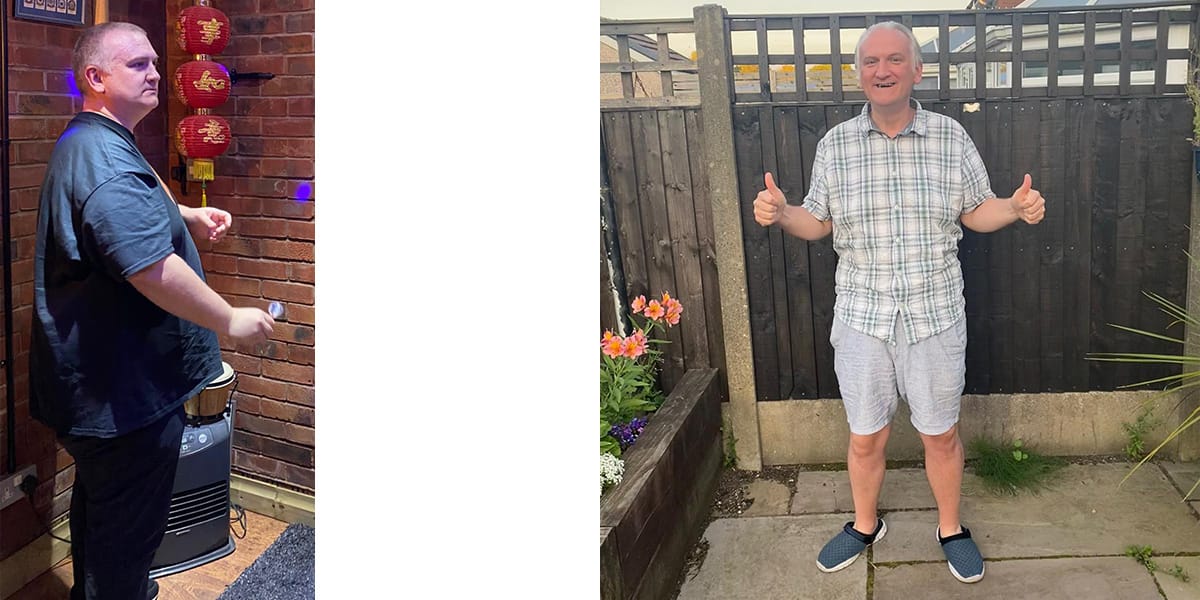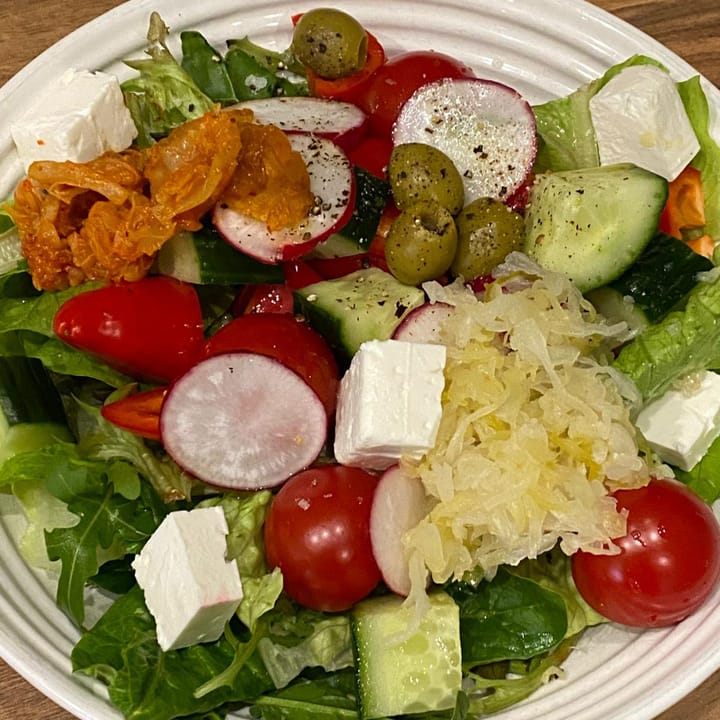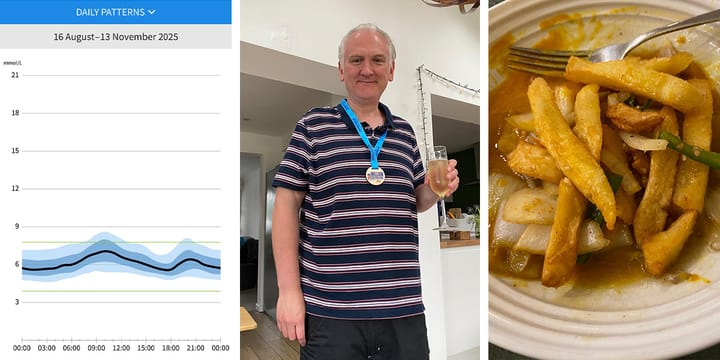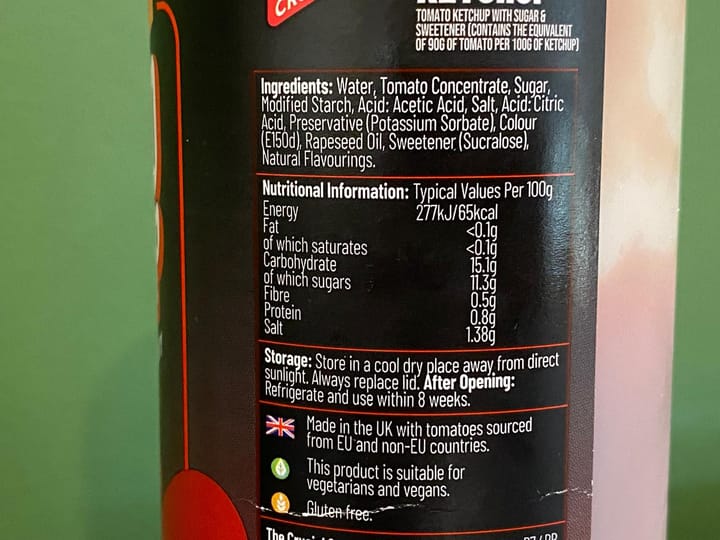How to lose weight with type 2 diabetes
What I learned this week #10 is an overview of how to lose weight without putting yourself on a severe calorie restriction diet

I am not the sort of person who likes to talk about weight loss at all. Taking the above photo really made me cringe. It really grates me when people feel the need to comment on my weight (good or bad). If you tell someone they look great because they've lost weight, you're reverse body-shaming them, because you're saying they didn't look great or acceptable before. It's fine to tell someone they look well if they look happy and healthy, but don't comment on their weight. Unless you're paying for someone's rent, mortgage, food, bills, or looking after their children, then their weight is none of your business. It's infuriating to be judged by people who do not have the same metabolic rate, genetics, microbiome, and most importantly work or family commitments that get in the way of being able to follow healthy habits. Having a desk job and a four hour daily commute, or working night shifts, makes it incredibly difficult to eat at the right times, exercise, and have time to prepare healthy meals. Combine these factors with the ultra processed food swamp we live in, and a lack of good nutritional information, it's no wonder that around a third of adults in the UK are obese.
"If they ain't paying your bills, pay them bitches no mind." Ru Paul
I started drinking more during the Covid lockdown of 2020, generally trying to make the most of being stuck at home all the time. I think this (and getting addicted to crumpets) was what contributed to me being diagnosed with type 2 diabetes that year. Like most people, boredom was the main issue, and going out in public was just incredibly stressful. I'd always thought diabetes was something you got from having too much sugar which I generally didn't consider myself to be having an excessive amount of but it's much more linked to excess carbohydrates in general. Our evolutionary history has prepared us for long periods of food scarcity and not constant abundance.
'Moderation' and 'portion control' is a marketing scam
If any food is supposed to be consumed in moderation, it's more than likely not good for you. Your natural satiety hormones will regulate your eating habits if you eat whole food and avoid fructose and alcohol.
Nature designed fructose to make you fat
You never see obese animals in the wild. The only time animals put on weight is when they gorge on fruit or honey before winter in preparation for hibernation or a long distance migration. Following this period of hardship they return to their normal weight. The modern human food system has created an artificial situation where fructose is available all year round. We have evolved to crave sugar and to eat as much of it as possible to prepare us for harsh, ice-age level winters. Fructose inhibits leptin, which is a satiety hormone that essentially tells your brain "We've got plenty of fat stores, no need for more food thanks."
You need to lower insulin to lose weight
The most important concept in weight loss is to reduce insulin. Insulin is a fat-storage hormone that will block your body from utilising its fat stores. In type 2 diabetes, your cells have become insulin resistant, meaning that your pancreas has to produce more insulin that would normally be required to get the glucose out of the blood stream and into the cells. Insulin resistance is an adaptation that has evolved to help to protect the brain in the event of food shortage as it makes sure that glucose is prioritised for use by the brain and not other tissues and organs. Unless you have type 1 diabetes, the only way to reduce insulin levels is to cut glucose levels by reducing carbohydrate intake.
Calorie counting is an inefficient weight loss strategy
Severely reducing your daily calorie intake will lower your basal metabolic rate (BMR), making it harder to lose weight. This is your body's rate of energy expenditure that occurs at rest - i.e. the basic energy needs for breathing, sleeping, digestion, thinking etc. This uses a lot more calories than doing an hour's exercise so it's worth being mindful of anything that reduces BMR.
More importantly, not all calories are the same in terms of their metabolic impact. This isn't to say you can continuosly eat too many calories, but the key is that different macronutrients will have different effects on your sense of satiety and how your body processes these different fuel sources:
Protein
This is the most important macronutrient that is used to repair damaged cells and create new ones. For me, understanding protein leverage was essential to understanding how to lose weight without feeling constantly hungry. Once you've eaten enough protein for the day, you will feel full.
Fat
Ancel Keys led research in trying to prove the diet-heart hypothesis (the theory that dietary fat increases cholesterol and causes heart attacks) after people were becoming more concerned about cardiovascular disease following the second world war. He cherry-picked data from seven out of 22 countries to make the data fit his hypothesis but his legacy of saturated-fat-o-phobia lives on as an inherited nutritional dogma that is difficult to shift because there is more profit in selling ultraprocessed carbohydrate-based food than animal-based fats.
Fat has the lowest blood glucose response of any other macronutrient so eating more fat, and less carbohydrate, will help to keep your insulin levels low which is key to weight loss.
Prioritising fat over carbohydrate will help to promote nutritional ketosis where your body starts to use ketones for fuel in addition to glucose when glucose levels are low. It's a common dogma that 'glucose is the body's preferred source of fuel'. The body will prioritise using glucose because high levels become dangerous, so it is trying to bring levels down by using glucose before ketones from fat stores. It will also prioritise fructose and alcohol metabolism before glucose as they have toxic effects on cells.
Carbohydrate
Carbohydrates are generally considered an essential macronutrient but there is a growing popularity of carnivore and ketogenic diets that either avoids them altogether or drastically reduces them. Your body needs glucose in order to function but the important thing to be aware of is that your body will produce glucose from fat or protein if it needs to in a process called gluconeogenesis.
Carbohydrates are either starches or sugars. They both contain glucose but the fructose in sucrose (common table sugar) blocks the liver with fat and causes insulin resistance. If you want to lose weight, you need to avoid sugar as much as possible.
For me, I now almost entirely avoid grains of any kind: rice, oats, breakfast cereal, rice or wheat noodles. I find a small portion of roast potatoes or linguine pasta doesn't have as large a glucose spike as other starches. Also shiratake rice or noodles is made from konjac root which has virtually zero carbohydrates. I find pea-based pasta equivalents and similar products still spike my glucose levels quite a bit.
Alcohol
Alcohol is very similar to sugar, where the yeast has done the first bit of digestion for you. It can provide a lot of energy but also clogs the liver with fat and contributes to insulin resistance. It is also a toxin that can damage just about every type of cell in your body. If you want to lose weight you'll need to avoid or reduce alcohol consumption if you're currently drinking too much (I still have work to do on this).
Reduce and eliminate Ultra Processed Food (UPF)
I lost my first 4.5 stone by gradually reducing, and weaning myself off the UPFs in my diet. The hard bit is finding the time to wash and prepare food. Buying frozen whole food can help when cost and time are issues. Freezing means manufacturers don't have to use as many preservatives, so it can be a good way of buying meat and vegetables, but do watch out for anything you don't recognise on the ingredients list.
UPF is designed to be addictive and overconsumed. To recognise it you just need to look at ingredients labels - anything that you don't recognise as normal food is best avoided. Another instant flag is any health claim or excessive branding on the packaging:
- Low-fat/Fat-free (usually means high-sugar or full of emulsifyers)
- Heart-healthy (grains are not heart-healthy when you're insulin resistant)
- Promising to give you energy (food should do that by default)
- No added sugar (what else have they put in instead?)
- Natural flavouring (a natural flavour would just be an ingredient like strawberries)
- Natural sugars (your body will do the same thing with fructose, regardless of where it came from)
- Emulsifyers, preservatives, E-numbers,
- anything ending in '...rose' or '...dextrin' (manufacturers often use more than one kind of sugar to avoid having to list it as the first ingredient)
Drink water
Hydration can significantly improve your metabolic function as cells need the right balance of water and electrolytes to function and move resources around the body.
Contrary to everything I've previously been told about salt, you need some to stay hydrated. The water we would have consumed in our hunter-gatherer days would have been from moving rivers, streams and springs that would have contained high mineral content. Our modern water treatment is necessary now because of the levels of pollution in most natural water sources. Good quality mineral water is a good option but to compensate for what has been taken out of tap water, you can take a crystal of sea or rock salt after a glass of water (definitely not the industrially produced sodium chloride granules). I also include whole nuts and dark chocolate in my diet as they are rich sources of electrolytes which help to keep you hydrated and your cells functioning.
Work on reducing and eliminating soft drinks and fruit juices as they are all either UPF or full of sugar and will actually cause dehydration. Diet soda drinks can have a lot of health implications as well as making you hungry.
Caffeine can also cause dehydration as well as acute insulin resistance so I avoid it around breakfast time and after 3pm.
Herbal and leaf teas can provide vitamin C and electrolytes. Rooibos is also a good caffeine-free option.
You do not need to eat three or more meals per day
Going without a meal will help your body clear out excess glucose and bring your insulin levels down. It needs this rest from constant glucose input in order to get back to a natural baseline.
Breakfast is not the most important meal of the day
You do not need to have breakfast to activate your circadian rhythm or have enough energy for the day.
Fasting
Going without food for a day can have a huge range of health benefits as well as getting blood glucose and insulin levels down. It can be intimidating to try this for the first time but I have found it a lot easier than I expected. Try intermittent fasting or missing out an occasional meal to give yourself some practice. Another popular option is One Meal A Day (OMAD) which can be good if you have limited time to prepare and/or eat meals. If you have a Continuous Glucose Monitor (CGM), that will provide reassurance that your glucose isn't going too low if you want to try any kind of fasting.
Exercise will make it harder to lose weight to start with
The adage "move more, eat less" is terrible advice for anyone who is struggling with obesity. Excessive exercise while restricting calories can lower BMR due to metabolic adaptation, making weight loss harder in the long term.
Exercise is very good for your general health and will help you to shift the last stone or two, but it's going to make it very difficult if you're over 20 stone and start trying to do 30 minutes of cardio every day, you could give yourself a heart attack. At best you'll just make yourself very hungry before giving up on an unsustainable routine. Start with step-by-step changes to your diet as that is much more effective at getting your body into a fat burning routine.
This is not an excuse to be idle at all. Gentle movement will help to reduce excess glucose and improve insulin resistance. Frequency is more important than intensity of exercise so my advice for anyone who is struggling with obesity is to start walking more frequently. Even if it's just to a post box and back, or up and down the stairs twice a day, make a start and build from there.
Prioritise sleep
Getting 7-9 hours of good quality sleep for most nights will help to optimise your metabolism. The best way to improve sleep quality is to get up early and get some natural sunlight first thing in the morning. It's also best to avoid eating within two hours of bedtime and avoid bright light after sunset.
Remove sources of stress where possible
This is the hardest thing to change if you're in a stressful job, or have difficult relationships to deal with, but anything you can do to reduce the stress from these situations will help to keep your cortisol rhythm in check.


